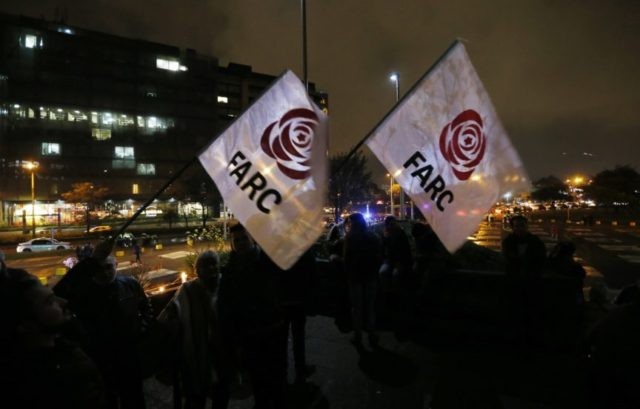A top peace negotiator for the Colombian terrorist group FARC who was expected to take a lawmaking seat in Colombia’s Congress this year was arrested late Monday on charges of attempting to traffic ten tons of cocaine into the United States.
The terrorist “Jesús Santrich,” real name Seuxis Hernandez-Solarte, was arrested after U.S. prosecutors sent a dossier with evidence against Santrich to Colombian authorities and triggered an Interpol red alert for his arrest. President Juan Manuel Santos vowed Tuesday not to hesitate to observe an extradition request given the ample evidence against Santrich; New York prosecutors have requested his extradition.
Santrich would have been one of the nearly dozen of members of the Revolutionary Armed Forces of Colombia (FARC) terrorists to receive uncontested congressional seats as part of a “peace deal” between the terrorist group and Bogotá brokered by the communist Cuban government. The FARC also attempted to launch a candidate in this year’s presidential election—the official leader of the group, alias “Timochenko”—but Timochenko dropped out of the race after suffering a heart attack last month. He did not poll above 2 percent during the time he was actively campaigning.
Santrich was scheduled to join the Colombian Congress in July.
According to a report in Colombia’s El Tiempo newspaper citing the U.S. prosecutors’ dossier used to arrest Santrich, evidence reportedly shows Santrich planning to import large amounts of cocaine into the country. The evidence reportedly reveals that Santrich used an attorney to deliver five kilos of cocaine to a contact as collateral for a deal that would have netted the FARC leader $15 million. Prosecutors added that Santrich allegedly met with the drug purchasers in his home the day after that transfer occurred. The final destination for the product was to be Miami, Florida.
Colombia’s Attorney General Nestor Martinez told reporters that the sale of the cocaine to consumers would have netted $320 million.
“Hernández Solarte and his accomplices continued the discussion regarding the possible shipment of great quantities of cocaine to sellers, including the use of airplanes registered in the United States to transport the drugs,” the Interpol red alert in his name read.
President Santos issued remarks Tuesday confirming that Colombian authorities had “resounding and conclusive proof” against Santrich. “My hand will not shake to authorize [extradition],” he promised, noting that Colombia’s judiciary must first accept the extradition request before he can order it to be executed.
In a press conference Tuesday, the FARC categorically denied the allegations and accused the United States of conspiring to take down the Marxist organization.
“Santrich’s detention is part of a plan orchestrated by the government of the United States with the cooperation of the Colombian prosecutors,” Iván Márquez, another of the FARC’s negotiators, told reporters. “It is clear that we are facing another fabrication by the twisted American justice system.”
FARC leaders also announced that Santrich would begin a hunger strike in prison.
“We know his iron will. Our support to his hunger strike and a call that he be accompanied by the prisoners of war that are still in the regime’s prisons,” Márquez said. “Santrich cannot be the trophy handed to [U.S. President Donald] Trump when he visits Colombia.”
The press conference occurred before President Trump announced Tuesday that he would cancel his trip to Latin America, citing obligations in handling the growing tensions in Syria.

COMMENTS
Please let us know if you're having issues with commenting.